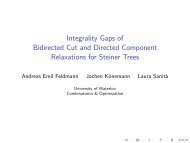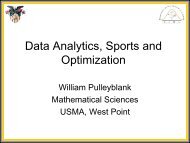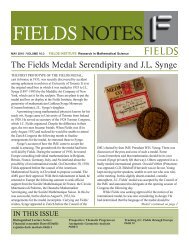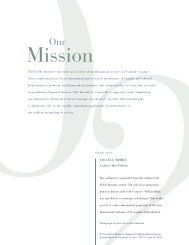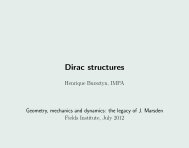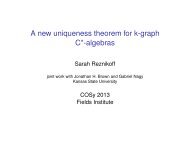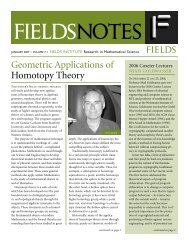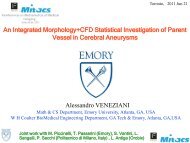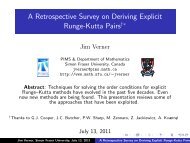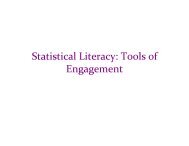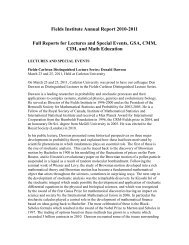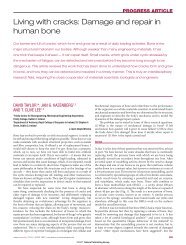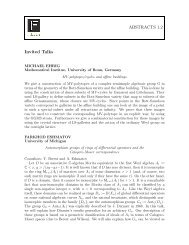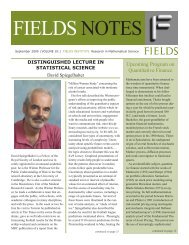Annual Report 2005 - Fields Institute - University of Toronto
Annual Report 2005 - Fields Institute - University of Toronto
Annual Report 2005 - Fields Institute - University of Toronto
Create successful ePaper yourself
Turn your PDF publications into a flip-book with our unique Google optimized e-Paper software.
Career: Some Remarks. On August 7, Dick DeVeaux (Williams<br />
College) addressed teaching statistics in an invited<br />
speech on Math is Music; Statistics is Literature – or Why are<br />
there no 6 year old novelists? In addition, two invited panel<br />
sessions featured candid remarks and advice from journal<br />
editors (Annals <strong>of</strong> Statistics, Canadian Journal <strong>of</strong> Statistics,<br />
Technometrics and Biometrics) for publishing, and grant<br />
directors/managers (NSF, NSERC, NIH, ONR) for grant<br />
applications.<br />
One highlight <strong>of</strong> the 2004 NRC is the first time nomination<br />
<strong>of</strong> the Richard L. Tweedie New Researcher Award. The<br />
award recipient will receive a prize <strong>of</strong> up to $2000 and be<br />
invited to give a special lecture at the NRC. The IMS Committee<br />
on Special Lectures will decide the award winner.<br />
In summary, the 2004 NRC was a great success, <strong>of</strong>fering<br />
a comfortable setting for new researchers to share their<br />
research and make connections with their peers in informal<br />
settings such as short research presentations and various<br />
social programs.<br />
Special Addresses:<br />
Richard D. DeVeaux (Williams College)<br />
Math is music; statistics is literature – or why are there no 6<br />
year old novelists?<br />
Xihong Lin (Michigan)<br />
Exploring roads to a successful career: some remarks<br />
Terry Speed (UC Berkeley)<br />
How to do statistical research<br />
Jeff C.F. Wu (Georgia Inst. <strong>of</strong> Tech)<br />
Statistics and statisticians: an amateur’s tour guide<br />
Workshop on Missing Data Problems<br />
August 5–6, 2004<br />
Held at the <strong>Fields</strong> <strong>Institute</strong><br />
Organizers: Richard J. Cook and Don L. McLeish (Waterloo)<br />
Modern data <strong>of</strong>ten includes some form <strong>of</strong> censorship or<br />
missing data. Data imputation is a critical component <strong>of</strong><br />
the analysis <strong>of</strong> such data and crude methods for data imputation<br />
can lead to substantial bias in the results and the<br />
conclusions. Missing data problems are common in health<br />
research (e.g. retrospective and prospective studies), sample<br />
surveys (e.g. non-response), and less obvious parts <strong>of</strong> any<br />
study in which the data available is influenced by what is<br />
G e n e r a l S c i e n t i f i c A c t i v i t i e s<br />
Jamie Stafford, Richard Cook and Don McLeisch<br />
easy or feasible to collect. Longitudinal studies which collect<br />
data on a set <strong>of</strong> subjects repeatedly over time are subject<br />
to attrition, subjects drop out because they move and<br />
suffer side effects from drugs, or for other <strong>of</strong>ten unknown<br />
reasons. Similarly in sampling, survey non-respondents are<br />
<strong>of</strong>ten ignored, although factors related to the objectives <strong>of</strong><br />
the study such as income may influence the completeness <strong>of</strong><br />
a subject’s response.<br />
The primary goal <strong>of</strong> this workshop was to provide impetus<br />
to the development <strong>of</strong> mathematical and statistical tools for<br />
the analysis <strong>of</strong> data under various patterns <strong>of</strong> censorship<br />
and mechanisms governing missingness and data imputation.<br />
The workshop brought together researchers from<br />
around the world with common interests in missing data<br />
problems and a broad range <strong>of</strong> approaches for dealing with<br />
them. Approaches ranged from those based on multiple<br />
imputation, inverse probability weighted and more general<br />
classes <strong>of</strong> estimating functions, and EM or generalized EM<br />
algorithms. Issues receiving lively discussion included the<br />
importance <strong>of</strong> robustness, efficiency, identifiability, and the<br />
role <strong>of</strong> sensitivity analyses. The range <strong>of</strong> contexts in which<br />
missing data problems were considered included studies<br />
involving retrospective observation, prospective longitudinal<br />
studies, event history studies, survey sampling, finance,<br />
and social sciences. The meeting was supported by <strong>Fields</strong>,<br />
NPCDS, the <strong>University</strong> <strong>of</strong> Waterloo, and GlaxoSmithKline.<br />
<strong>Fields</strong> <strong>Institute</strong> <strong>2005</strong> ANNUAL REPORT 59



